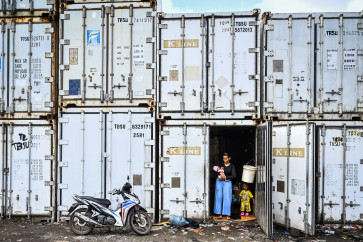Popular Reads
Top Results
Can't find what you're looking for?
View all search resultsPopular Reads
Top Results
Can't find what you're looking for?
View all search resultsA true haven for vegans
As in most other developing countries, vegetarianism has been a bit slow to catch on here in Indonesia
Change text size
Gift Premium Articles
to Anyone
As in most other developing countries, vegetarianism has been a bit slow to catch on here in Indonesia.
In a country where the more pressing question is how to feed the millions of inhabitants with the scant food available, and less about what type of healthy food the people should eat, vegetarianism is a luxury only a few can afford.
But in a country where stalls selling sate kambing (mutton satay), sop buntut (oxtail soup) and babi guling (roast suckling pig) abound on every street, being vegan here is surprisingly easy.
And it seems that for every bite of steak or every drop of fat you consume, you can just as easily find the antidote in the assortment of vegetables (lalapan) favored in Sundanese cuisine or the mix of greens found in the ubiquitous pecel Madiun food stalls.
With an abundance of vegetables, Indonesia’s culinary options never cease to satisfy the taste buds of even the fussiest vegan who refuses to eat any kind of animal-based food product.
British expatriate Lorna Power has lived in Jakarta for four years and says it has never impeded on her 25 years as a vegan.
“On the whole, most people here understand the concept of vegetarianism and it’s not difficult to find a wide range of fresh vegetables and even organic vegetables in local supermarkets,” she says.
During her time here, Power’s most significant find has been tempeh – along with numerous other soy-based products – for which she couldn’t be more grateful.
“I love tempeh, and I never knew about until I came to Jakarta,” she says.
Local resident Adi Kuntoro is similarly enchanted by the wide variety of food available to vegetarians.
With such a big selection of cheap and fresh vegetables grown year-round across country, adopting a vegetarian lifestyle couldn’t have been easier, he says.
Adi says he used to live in Bandung, West Java, where fresh vegetables were always included in meals.
“I can always find a non-meat dish whenever I eat out with friends,” he says, adding he has never been able to stomach meat – literally.
“Growing up, I used to throw up whenever I ate meat, including white meat or fish, so my mother stopped cooking that.”
He adds he hasn’t forsaken eggs and cheese, though, but has sworn off milk.
In Jakarta, however slowly, vegetarianism has started to gain ground. More and more restaurants now offer meat-free dishes to customers, and they can be quite tasty.
Some vegetarians, however, are less than impressed. Power and Adi both say they avoid such restaurants.
“I’ve been to a couple of vegetarian restaurants with non-vegetarian friends, just to take a look,” Adi says.
“But some of my friends said the food didn’t taste any different from regular meat dishes.”
Power says she opts for Indian or Chinese restaurants whenever she wants to take her friends out to dinner.
“I don’t want to limit the choice for my [non-vegetarian] friends, and the restaurants, especially Chinese ones, generally have a lot of vegetable dishes on their menus,” she says.
She adds she occasionally goes to vegetarian restaurants, including one close to her office at the Indonesia Stock Exchange in the Sudirman Central Business District in Central Jakarta.
Power says she doesn’t eat out much and mostly cooks her own meals at home, to give herself complete control over what she consumes.
“It’s not just for the vegetarian reason. I cook at home because I want to control the amount of unwanted ingredients, like salt and oil, in my food,” she says.
Her motivation for going vegetarian was a conscientious affair: She loves animals and claims to be terrified at the prospect of putting them in her belly.
“It started with my love for animals; I don’t want to eat them,” Power says.
She is the only vegetarian in her family, although the other members don’t eat red meat.
Another vegan, Yudhanti, says that the growing number of vegetarian restaurants in the capital shows that people, food vendors included, are growing more aware about eating healthy.
“Back in the day it was always difficult to ask the waiter or food vendor to leave out the meat whenever I ordered fried noodles,” she tells the Jakarta Post.
“I’d have to give a lengthy explanation and still pay the same price.
“Now, in restaurants at least, it’s much easier to find dishes that don’t use meat at all.”
Yudhanti says she began shunning meat for health reasons.
“Some people do it for political reasons, so that they can be environmentally friendly and reduce their carbon footprint,” she says.
“For me, it was always about my health.”
Yudhanti, who still eats eggs and dairy products, picked up her vegetarianism back in 1996 when she joined a yoga class in Bandung.
Never a fan of red meat, she stuck with the habit even after she stopped practicing yoga.
“I don’t miss meat and I never get a craving for it,” she says, adding this is despite the fact her husband is a lover of all things meat.
But problems crop up when vegetarians travel outside of the big cities.
Food served at smaller hotels is often cooked in oil partially derived from animal fat, and more often than such hotels have a limited selection of vegetarian dishes.
“Whenever I travel these days, I often have to take some of my own food so that at least I can still eat something,” Power says.










